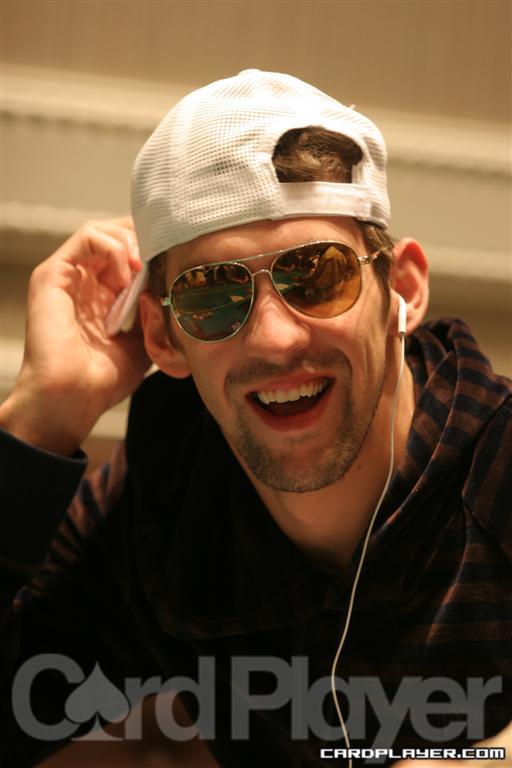






Tournament Trail Q and A -- Michael PhelpsThe Two-Time Olympian Talks About Why Poker Appeals to Him |
|
|

Phelps made the final table of event No. 2 at the Caesars Palace Classic ($1,500 no-limit hold’em), where he finished in ninth place and earned $5,213 in prize money in a field of 187 players. He was back at it the next day, entering event No. 5 ($1,000 no-limit hold’em). His run in this tournament was much shorter than the former, but it took a bad beat to send him to the rail in both cases (his opponent hit an ace-high straight on the river to defeat Phelps' pair of aces with a king kicker in event No. 5).
Card Player caught up with Phelps on his way out of the Caesars Palace poker room and he talked about the competitive, social, and leisure aspects of poker that attracted him to the game.
Ryan Lucchesi: You could do anything you wanted after winning eight gold medals. Why choose poker as a way to relax after four hard years of training?
Michael Phelps: I love to play, and its fun; it’s exciting. I think this is a good time for me to learn some things, to pick up a few things in poker, to try to read people and [learn the] mindset that goes into it and everything — just to try something new. I’ve been playing for a few years, and I started getting more serious, and I’ve only played four live tournaments in my life. I’m just trying to get some more experience. I’m two for four on final tables, so that’s not bad.
RL: How much of a confidence boost has it been for your poker game to make a final table very early in your live tournament poker experience?
MP: It’s good, it felt really good. I was confident, I was happy, I was excited. I had the table down, I knew the players that were in the final 18 with me and the final table. I was just really confident about it, I got it in good, and I picked my spots. I’m learning more from my friends, some of the big-name guys online, and some of the [live] pros, so it’s been cool.
RL: How have the pros responded to you, and what strategy advice have they given you to improve your poker game?

RL: You mentioned a lot of great online players who you know well. Did you really learn to play the game online? What limits did you progress through?
MP: A little bit. I really started to increase the volume of tourneys now that I have free time to play now, just trying to have some fun with it. I started cash at $1-$2 [no-limit hold’em], and I’ve played some pretty big games online. I’ve played $100-$200 online before, just having fun. I just enjoy it. I fluctuate all over the place. If I play live, it’s usually $5-$10 or $10-$20. I was talking to “SCTrojans” [Scott Freeman], and he’s like, why don’t you play a $15K event? I want to get more experience in live tourneys.
RL: When do you think you might make that jump to the big buy-in tournaments?
MP: I’m not sure. Who knows what’s going to happen? A couple of my friends and I are going to go to the PCA and maybe will try the Aussie Millions. I’ll probably play in some bigger tourneys; these are sort of a warm up.
RL: Is the competitive aspect of poker something that attracted you?
MP: It was more something so that I could have time to myself. I could relax, I could be myself, and I could have fun. It’s a place where I can be me.
RL: Poker is often called a social game. How big a factor is that in your attraction to the game?

RL: One thing that was said many times during the Olympics is that you’re so good that you’re competing against yourself a lot of the time in the pool. How does that relate to the mental aspect of poker? How well do you compete against yourself mentally at a poker table when you take a bad beat and try not to tilt?
MP: I’ve been learning more and more about that. In poker I’ve got to the point where I have seen every bad beat, or heard every bad beat. “JohnnyBax” [Cliff Josephy] came over to me the other day and told me about a beat that he took. [Pocket] fours on a 7-4-4 flop lost to running sevens. I mean, you hear every story about everything. I think I’ve learned now that whatever happens, happens, and I’m having fun and enjoying myself. And for me, I just want to get it in good. If I get it in good, I don’t care. Just leave it all up to the chance of the cards.
